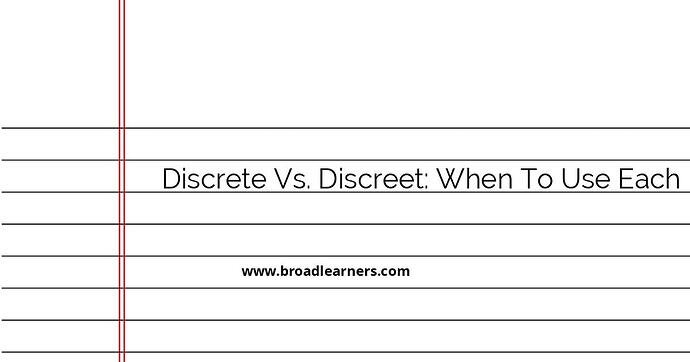While 'discrete' and 'discreet' sound almost identical in pronunciation, they have entirely different meanings and uses. Knowing when to correctly use each of these words is important for clear, effective communication. Below, you'll find a detailed explanation of both terms, so you'll never mix them up again.
- 'Discrete'
The word 'discrete' is an adjective meaning distinct, separate, or individually separate and distinct. It refers to things that are distinct or unconnected with one another.
Usage Tips: Use 'discrete' when describing separate elements or parts.
Examples:
Example 1: The company is organized into several discrete divisions, each focusing on a different market sector.
The sentence demonstrates that the company's divisions are separate and independent of one another, each functioning in its own distinct area.
Example 2: The teacher noticed discrete trends in the performance of different student groups.
This highlights that the trends were distinct and not continuous, meaning each group had its own unique pattern of performance.
- 'Discreet'
The word 'discreet' is an adjective that means careful and circumspect in one's speech or actions, especially to avoid causing offense or to gain an advantage. It often denotes carefulness and subtlety in actions or words.
Usage Tips: Use 'discreet' when referring to someone who is careful about keeping something confidential or being tactful.
Examples:
Example 1: The manager was discreet about the upcoming changes, ensuring not to alarm the staff unnecessarily.
This example shows that the manager exercised caution and tact to prevent employees from becoming worried.
Example 2: They had a discreet meeting in a private room to discuss confidential matters.
Here, 'discreet' is used to describe a meeting that was conducted in a secretive manner to maintain confidentiality.
By distinguishing between 'discrete' and 'discreet,' you can ensure accurate and precise communication in both written and spoken forms. Remember:
- 'Discrete': Think of separation, distinct parts, or individual units.
- 'Discreet': Think of being careful, cautious, or tactful.
Did I miss anything? Respond below
